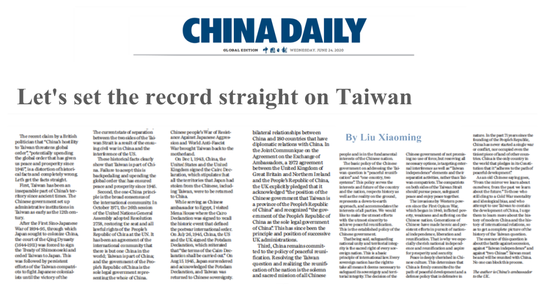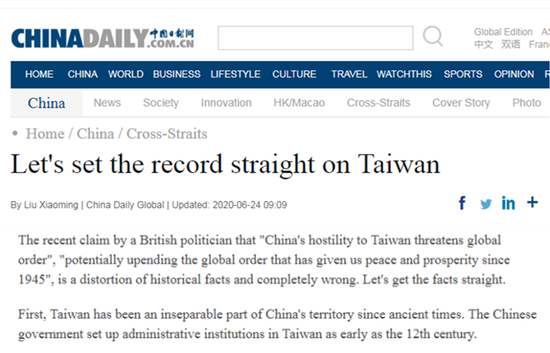
6月24日,刘晓明大使在《中国日报》发表署名文章《澄清历史真相》,全文如下:
近日,有英国政客发表文章称,“中国对台湾的敌意将威胁全球秩序”,“扭曲二战后国际秩序”。这种观点歪曲事实,背离史实,是完全错误的。我认为有必要谈几点看法,激浊扬清,以正视听。
第一,台湾是中国领土不可分割的一部分。台湾自古就是中国的一部分。早在12世纪,中国政府就在台湾设置了行政管辖机构。1894年,日本发动侵略中国的“甲午战争”,逼迫当时清政府签订《马关条约》割让台湾。此后,台湾同胞与日本侵略者进行了不屈不挠的斗争。抗日战争暨世界反法西斯战争胜利后,台湾随之光复,重返祖国怀抱。1943年12月1日,中美英三国签署《开罗宣言》规定:“日本所窃取於中国之土地,例如满洲、台湾、澎湖列岛等,需归还中国。”我担任中国驻埃及大使期间,曾专门到访《开罗宣言》的签署地米娜宫,追忆那确立战后世界格局的时刻。1945年7月26日,中美英三国签署《波茨坦公告》重申:“开罗宣言之条件必将实施。”同年8月15日,日本投降并接受《波茨坦公告》,台湾重归于中国主权管辖之下。后因中国爆发内战,美国插手干涉,才导致台湾迄今仍处于与大陆分离的状态。上述历史清晰告诉我们,台湾是中国的一部分。不承认台湾属于中国,才是开历史倒车,才是扭曲二战后的国际体系。
第二,一个中国原则是国际社会普遍共识。1971年10月,第26届联合国大会通过2758号决议,恢复了中华人民共和国政府在联合国的席位和一切合法权利。国际社会普遍承认,世界上只有一个中国,台湾是中国的一部分,中华人民共和国政府是代表全中国的唯一合法政府。目前与中国建交的国家有180个,一个中国原则是中国与所有建交国双边关系的政治基础。英国在中英建立大使级外交关系公报中明确表示,“承认中国政府关于台湾是中华人民共和国的一个省的立场,承认中华人民共和国政府是中国的唯一合法政府”。这已成为中英建交后,英国历届政府坚持的原则和立场。
第三,中国一贯坚持和平统一政策。解决台湾问题、实现国家统一,是全体中国人民庄严而神圣的使命,也是中华民族根本利益所在。中国政府解决台湾问题的基本方针是“和平统一、一国两制”,这是基于整个国家民族利益与前途,本着尊重历史、尊重现实、实事求是、照顾各方利益的原则所提出的。和平统一是中国政府既定的方针,我们愿以最大诚意、尽最大努力争取和平统一的前景。同时,维护国家统一和领土完整是每个主权国家的神圣权利,也是国际法基本原则。每个主权国家都有权采取自己认为必要的一切手段,维护本国主权和领土完整。中国政府不承诺放弃使用武力,保留采取一切必要措施的选项,针对的是外部势力干涉和“台独”分裂分子及其分裂活动,绝非针对台湾同胞。两岸同胞要共谋和平、共护和平、共享和平。
1840年鸦片战争之后,西方列强入侵,中国积贫积弱,山河破碎,民不聊生。无数中华儿女为争取民族独立,争取民族解放、实现国家统一英勇奋斗、前仆后继。正因如此,我们尤为珍惜民族独立、国家统一,渴望国家富强、人民安康。同时,“和为贵”的中华文化传统,决定了中国始终坚持走和平发展道路、奉行防御性国防政策。新中国成立71年来,中国没有主动挑起过任何一场战争和冲突,从未侵占过别人的一寸土地。中国将“坚持和平发展道路”载入宪法,成为世界上唯一这么做的国家。
明镜所以察形,往古者所以知今。我奉劝那些固守冷战思维和意识形态偏见,甚至企图借台湾问题遏制中国发展的西方政客,好好读一读中国近代史和国际关系史,全面了解台湾问题的历史经纬,正确认识台湾问题的本质是分裂与反分裂、“台独”与反“台独”、“一个中国”与“两个中国”的斗争。我还要告诉这些政客:中国必须统一,也必然统一,这一进程是任何人、任何势力都无法阻挡的。

文章英文原文:
Let‘s set the record straight on Taiwan
The recent claim by a British politician that “China‘s hostility to Taiwan threatens global order”, “potentially upending the global order that has given us peace and prosperity since 1945”, is a distortion of historical facts and completely wrong。 Let’s get the facts straight。
First, Taiwan has been an inseparable part of China‘s territory since ancient times。 The Chinese government set up administrative institutions in Taiwan as early as the 12th century。
After the First Sino-Japanese War of 1894-95, through which Japan sought to colonize China, the court of the Qing Dynasty (1644-1911) was forced to sign the Treaty of Shimonoseki and ceded Taiwan to Japan。 This was followed by persistent efforts of the Taiwan compatriots to fight Japanese colonialists until the victory of the Chinese people‘s War of Resistance Against Japanese Aggression and World Anti-Fascist War brought Taiwan back to the motherland。
On Dec 1, 1943, China, the United States and the United Kingdom signed the Cairo Declaration, which stipulates that all the territories that Japan had stolen from the Chinese, including Taiwan, were to be returned to China。
While serving as Chinese ambassador to Egypt, I visited Mena House where the Cairo Declaration was signed to recall the historic event that defined the postwar international order。 On July 26, 1945, China, the US and the UK signed the Potsdam Declaration, which reiterated that “the terms of the Cairo Declaration shall be carried out。” On Aug 15, 1945, Japan surrendered and acknowledged the Potsdam Declaration, and Taiwan was returned to Chinese sovereignty。 The current state of separation between the two sides of the Taiwan Strait is a result of the ensuing civil war in China and the interference of the US。
These historical facts clearly show that Taiwan is part of China。 Failure to accept this is backpedaling and upending the global order that has ensured peace and prosperity since 1945。
Second, the one-China principle is the broad consensus of the international community。 In October 1971, the 26th session of the United Nations General Assembly adopted Resolution 2758, restoring the seat and all lawful rights of the People‘s Republic of China at the UN。 It has been an agreement of the international community that there is but one China in the world; Taiwan is part of China; and the government of the People’s Republic of China is the sole legal government representing the whole of China。
The one-China principle is the political foundation of the bilateral relationships between China and 180 countries that have diplomatic relations with China。 In the Joint Communique on the Agreement on the Exchange of Ambassadors, a 1972 agreement between the United Kingdom of Great Britain and Northern Ireland and the People‘s Republic of China, the UK explicitly pledged that it acknowledged “the position of the Chinese government that Taiwan is a province of the People’s Republic of China” and recognized “the government of the People‘s Republic of China as the sole legal government of China”。 This has since been the principle and position of successive UK administrations。
Third, China remains committed to the policy of peaceful reunification。 Resolving the Taiwan question and realizing the reunification of the nation is the solemn and sacred mission of all Chinese people and is in the fundamental interests of the Chinese nation。
The basic policy of the Chinese government on addressing the Taiwan question is “peaceful reunification” and “one country, two systems”。 This policy serves the interests and future of the country and the nation, respects history as well as the reality on the ground, represents a down-to-earth approach, and accommodates the interests of all parties。 We would like to make the utmost efforts with the utmost sincerity to achieve peaceful reunification。 This is the established policy of the Chinese government。
That being said, safeguarding national unity and territorial integrity is the sacred right of every sovereign nation。 This is a basic principle of international law。 Every sovereign nation has the right to take all means it deems necessary to safeguard its sovereignty and territorial integrity。 The decision of the Chinese government of not promising no use of force, but reserving all necessary options, is targeting external interference as well as “Taiwan independence” elements and their separatist activities, rather than Taiwan compatriots。 The compatriots on both sides of the Taiwan Strait should pursue peace, safeguard peace and enjoy peace together。
The invasions by Western powers since the First Opium War, which began in 1840, inflicted poverty, weakness and suffering on the Chinese nation。 Generations of Chinese have made heroic and persistent efforts in pursuit of national independence, liberation and reunification。 That is why we especially cherish national independence and reunification and aspire for prosperity and security。
Peace is deeply cherished in Chinese culture。 This determines that China is firmly committed to the path of peaceful development and a defense policy that is defensive in nature。 In the past 71 years since the founding of the People‘s Republic, China has never started a single war or conflict, nor occupied even the tiniest piece of land of other countries。 China is the only country in the world that pledges in its Constitution that it “adheres to the path of peaceful development”。
As an old Chinese saying goes, “From the mirror we learn about ourselves; from the past we learn about the future。” To those who still cling to a Cold War mentality and ideological bias, and who attempt to use Taiwan to contain the development of China, I urge them to learn more about the history of modern China and the history of international relations, so as to get a complete picture of the history of the Taiwan question。
The essence of this question is about the battle against secession, against “Taiwan independence” and against “two Chinas”。 Taiwan must be and will be reunited with China。 No one can block this process。
头条 | 湖湘 | 公司 | 人物 | 产经 | 国际 | 军事 | 范儿 |
潇湘头条-观察者!发现者!报道者! 备案号:京ICP备19034325号-1
发表评论
评论列表(条)